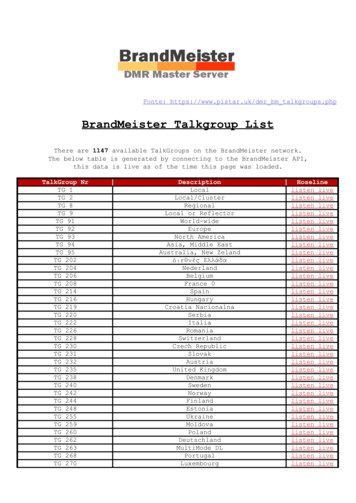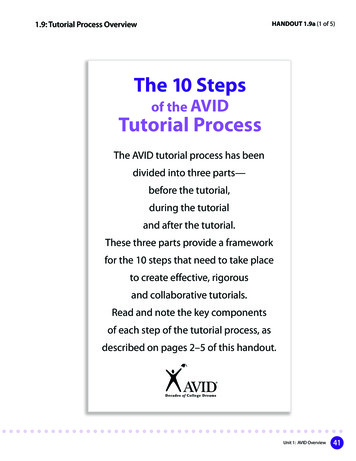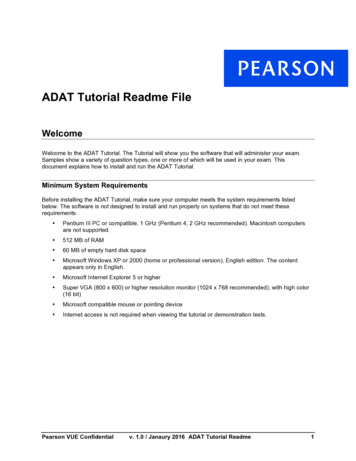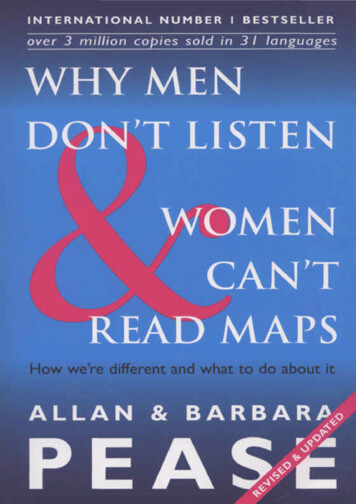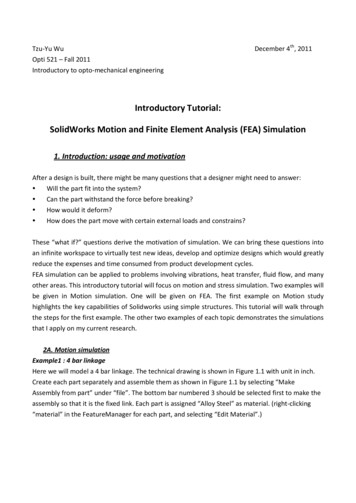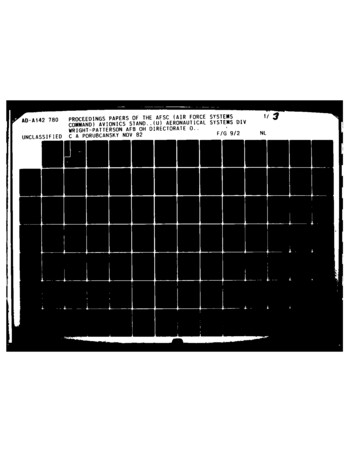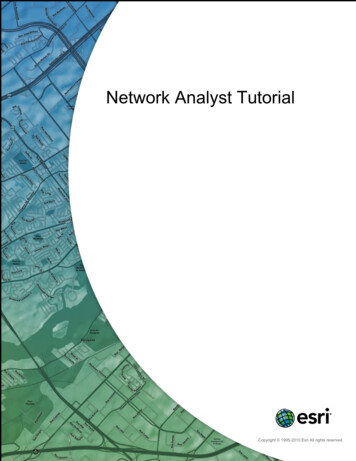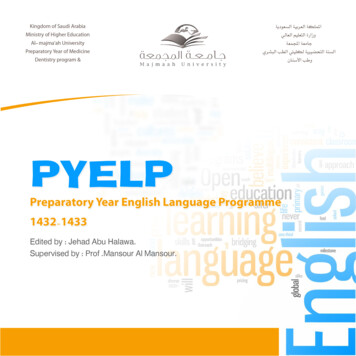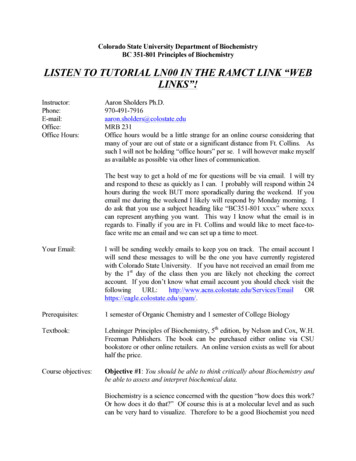
Transcription
Colorado State University Department of BiochemistryBC 351-801 Principles of BiochemistryLISTEN TO TUTORIAL LN00 IN THE RAMCT LINK ce Hours:Aaron Sholders Ph.D.970-491-7916aaron.sholders@colostate.eduMRB 231Office hours would be a little strange for an online course considering thatmany of your are out of state or a significant distance from Ft. Collins. Assuch I will not be holding “office hours” per se. I will however make myselfas available as possible via other lines of communication.The best way to get a hold of me for questions will be via email. I will tryand respond to these as quickly as I can. I probably will respond within 24hours during the week BUT more sporadically during the weekend. If youemail me during the weekend I likely will respond by Monday morning. Ido ask that you use a subject heading like “BC351-801 xxxx” where xxxxcan represent anything you want. This way I know what the email is inregards to. Finally if you are in Ft. Collins and would like to meet face-toface write me an email and we can set up a time to meet.Your Email:I will be sending weekly emails to keep you on track. The email account Iwill send these messages to will be the one you have currently registeredwith Colorado State University. If you have not received an email from meby the 1st day of the class then you are likely not checking the correctaccount. If you don’t know what email account you should check visit equisites:1 semester of Organic Chemistry and 1 semester of College BiologyTextbook:Lehninger Principles of Biochemistry, 5th edition, by Nelson and Cox, W.H.Freeman Publishers. The book can be purchased either online via CSUbookstore or other online retailers. An online version exists as well for abouthalf the price.Course objectives:Objective #1: You should be able to think critically about Biochemistry andbe able to assess and interpret biochemical data.Biochemistry is a science concerned with the question “how does this work?Or how does it do that?” Of course this is at a molecular level and as suchcan be very hard to visualize. Therefore to be a good Biochemist you need
to know how to look at, interpret and critically assess data. I hope to helpyou in this endeavor.Objective #2: You should be able to define and recognizes major conceptsand principles in Biochemistry.You must understand that the field of Biochemistry is so large and socomplex that no one could ever understand and retain it all. I am going tohelp you define some Biochemical concepts and I am going to try to stick tothe principles. Understand though that I will use very detailed examples tohelp establish those principles for you. These examples come with anomenclature of their own that is unique to that field of Biochemistry andhas been established in the primary journals. This is the case with much ofBiochemistry, the nomenclature and labeling is horrific. However, once youlearn the nomenclature of a certain system then the principles ofBiochemistry are very similar across topics.Objective #3: You should walk away from this class saying “That is a coolsubject I want to know more!”This may be a bit idealistic but I do want to develop in you a sense ofrespect, reverence and awe for the wonderful intricacies and design of thecell and the macromolecules therein. Hopefully the questions we pose andseek to answer will develop in you a hunger to learn more.RamCT:All course material will be presented via RamCT. Here are a couple of linksto help you get familiar with RamCT:1. Login page:a. https://ramct.blackboard.com/b. You will need an eID and password to login. If you don’t haveone of these you can get it from this website. Simply click on“Get eID” http://www.acns.colostate.edu/2. Getting Started:a. aspxb. I have found Safari (Mac) to work very well with RamCT andthe specific materials I will be asking you to stream from the site.Firefox as well as Internet Explorer will work fine as well,HOWEVER Internet Explorer DOES have some issues thataffect the view of EXAMS!!! If you plan to use IE8/9 thenplease see the IE8/9.pdf document I attached to my introductoryemail and placed in the “Syllabus/Schedule” tab on RamCT.3. In Blackboard:a. Course Dashboard:i. This will indicate due dates for your assignments. A wordof caution this tool has some BUGS and I ask that you
b.c.d.e.Course Materials:refer to your course schedule for due dates. Allassignments are due at 11:59PM Mountain Time on theday listed in the schedule.Course content:i. This is where you will be able to download lecture notes,the syllabus and schedule and any study tools I makeavailable to you.ii. You will also find all the Lecture Recordings in thisarea. I expect you to listen to all of these.Assessments:i. This is where your quizzes and exams will be found.My Gradesi. I will report the grades on all your assignments in thistool as well as your final grade.Discussion:i. I am making this available to facilitate studentinteraction. I will not enter the discussions myself unlessa student directly asks me to help them via email. Thiswould also be a good place to arrange study groups forindividuals within the same local.I am going to give you several things to help you gain knowledge of theprinciples of Biochemistry. Ultimately I will leave it up to you todetermine how to go through the resources I am making available to youbut I have designed the Tutorials to be the organizing force in this class.1. Tutorials/Recordings:a. The material that we will cover in this class is bestbroken down into 12 different topics that I am deeming“Lectures”. Accompanying each lecture will be anumber of “tutorials” for each major section in thelecture notes.b. Each “tutorial” is an audio-visual file of a lecture that Igave in my traditional course last spring. Theretherefore is an audience of about 150 people that ofcourse interact with me via questions. The majority ofthe time I repeat the questions so that you know whatwas being asked. I also need to say that I do allude toupcoming tests and days of the week in many of theselectures. You will need to remember that thesedates/days of the week apply to the audience for thatclass and not to you. The schedule for this classdetermines your tests dates etc.c. The files are Flash files and the most recent version ofFlash is available online for free at this ely
2.3.4.5.6.ipads, ipods, and iphones do not support this playerBUT desktop Macs do. Let me know if you havetrouble streaming and we can develop a work-aroundfor you.Powerpointsa. Each tutorial is an audio walkthrough of a powerpointpresentation. I am going to make these powerpoint filesavailable to you if you would like to use them to makenotes on. One warning though, each powerpoint iscomprised of a large number of slides and to print themoff may not be economical.Lecture notesa. The “Lecture notes” are an outline of the tutorials thatwill be given. There are 12 sets of lecture notes eachof which will have a number of different tutorials.These notes are designed to help organize the class andthe material presented in the class. If I were you Iwould print these off and make notes on them whileviewing the tutorials. The notes will include:i. Terms and their definitionsii. A list of Biochemical Principles covered in thatparticular lecture.iii. Outline of topics being covered.iv. Figures being used in the powerpointsv. Page numbers, from the book, covering thetopic at hand.The booka. The book is an excellent resource and I stronglyencourage you to use it to its fullest extent. I havegiven reading assignments for each set of lecture notesand have actually inserted page numbers from yourreading assignment into each section found in the notes.This will focus your reading as the text is fairlycomprehensive and not all of it will be used.b. In some areas you will find that the book is more or lessdetailed than my tutorials/notes. In these instances Iwill be holding you accountable for what I present andnot what the book presents/leaves out.Study Guidesa. These are very general questions directing yourstudying and your thinking.Practice examsa. Practice makes perfect and I STRONGLY encourageyou to do the study guide and the practice exam beforesitting down and taking the test.
Assessment:“So how are you going to assess me? In other words what will yourequire of me?”1. Quizzes – 50 pointsa. There will be 11 that you will need to accomplishthroughout the course of the semester. Each quiz willcover a specific portion of the lectures and this informationwill be made available to you. You will have two attemptsfor each quiz and as such you should be able to do quitewell on them. You will be given access to the quizzes onthe first day of class. See the class schedule for due datesof each quiz.2. Exams - 400 pointsa. I am going to give four exams each worth 100 points. Examswill be a combination of multiple choice, matching and shortanswers. Each exam will be made available to you online ina one-week window. This window allows you the freedom toschedule a time that works best for you to accomplish theassignment. Please see the schedule for when each examwill be available and what it will cover. All exams arepassword protected and passwords will only be given toUniversity approved proctors. It is your responsibility toselect an eligible proctor, schedule exams with yourproctor, and abide by all rules for bringing only appropriatematerials into the testing area.Exam Proctoring:In accordance with Colorado State University OnlinePlus proctoringguidelines, students have three options for having online exams proctoredfor this course. All three options require you to submit a ProctorAgreement Form found at http://www.online.colostate.edu/proctoring/ atleast two weeks prior to the first date the exam is available. Below is alist of your options:1. Work with an eligible proctor outside of Colorado StateUniversity. Your proctor selection is subject to approval. Anycosts incurred due to using an outside proctor is yourresponsibility. Please review the eligibility guidelines found onthe OnlinePlus website when selecting an outside proctor.2. Take the exam at an OnlinePlus facility in Fort Collins orDenver, or at the University Testing Center (UTC) oncampus. Schedule an appointment at least three days beforeyou need to take your exam. OnlinePlus offices do not chargefor proctoring services. Contact OnlinePlus at (970) 492-4704(Fort Collins) or (303) 573-6318 (Denver) or the UTC at (970)491-6498 for more information.
3. Use ProctorU, an online proctoring service, requiring awebcam and microphone. Schedule an exam with ProctorU atleast four days before you need to take your exam. The cost foronline proctoring is included in the cost of the course.How to Study:The question I am most often asked by students is “How do I study for thisclass?” As such I have decided to provide the answer up front so you canget started right away!The objective of studying is to learn the material that is being presented.Exams are designed to assess whether or not you have learned. So reallythe question is “How do I learn in this class?” I think the best way to dothis is to be prepared prior to listening to the tutorials. My suggestion is toreview questions I have presented to you in the study guides prior to theday that you listen to the material. Seek to answer these questions bydoing the reading I assign to you in the text and also researching the topicon the world wide web. If you can’t come to an answer you are satisfiedwith, no big deal, at least you have thought about the material beforelistening. Now when you listen your mind will be better prepared tounderstand the material I am presenting and you will be much more ableto pick out the important points in my lecture. Once the lecture is done,review your notes and reattempt to answer the questions in the studyguide. If you still can’t come to an answer then email me or come and seeme and I will hopefully set you straight.Finally, my last bit of advice would be to utilize the quizzes as a practicesession for the exam. You will have two attempts at each quiz. Study foryour first attempt by reviewing your notes and nailing down terms andconcepts. Put your notes and book away and take the quiz. If you dopoorly, no big deal, you have another attempt. On your second attemptreview your notes again, of course now with the questions in mind, keepyour notes and book open and take the quiz a second time. This processwill hopefully help you learn the material. I suggest doing the same thingwith the practice exam.Grades:GradeABCDFGrade Breakdown:AssignmentExams11 ow 60%Points Counted40050450% of points88%12%100%
Academic Integrity:The definition for integrity is:“the quality of being honest and having strong moral principles; moraluprightness”In practice I feel that this is best defined as “doing the right thing when noone is looking”. It is my goal to be a man of integrity in every facet of mylife. As such it is important for you to know what I feel that means for thiscourse. The following is a list of what you should expect from me interms of academic integrity:1. Make sure that what I teach is consistent with the most currentknowledge in my field to the best of my ability.2. To admit mistakes when made EVEN if they are not “caught” bystudents.3. To treat each student with the dignity and respect they deservebased upon their status as a human being.4. To understand and meet students needs particularly whencircumstances beyond their control impact their academicperformance.5. Make sure that each student is given an equal opportunity tosucceed in my course by:a. Providing the SAME study material for all studentson each exam as seen on Blackboard.b. Providing access to student in both review sessionsand my office hours.c. Providing every student with the SAME opportunityfor extra credit assignments.d. Providing every student with identical exam scoreadjustments if needed.That is what you should expect from me what though do I expect from you?Here is a list of my expectation for you the student in terms of academicintegrity:1. I expect that you will work hard at my course and take fullresponsibility for the grade you receive at the end of the semester.2. I expect that you will do all of your own work on both quizzes andexams. In other words you will not receive or use any unauthorizedassistance on both quizzes and exams.a. For quizzes this simply means that you will not allowsomeone else to give you the answers or to take thequiz for you. You may use any other resource(lecture notes, the book, powerpoint presentation etc)at your disposal for these assessments.
b. For exams this means that you will take it and youwill not use ANY resources other than theinformation recalled from your brain.c. For exams the study materials that I permit are thosefound on blackboard. Students MAY NOT use oldexams or practice exams from previous semesters as Icannot ensure each student has access to them.3. I also expect that you will not GIVE unauthorized assistance onquizzes or exams.4. I expect you to be honest in all your communication with me.In summary my desire is that this class maintains a HIGH level of academicintegrity consistent with the Student Code of Conduct.End of the Semester: I know that there will be a handful of people at the end of the semester thatneed “just a few points” to get the grade they desire. An extra credit quizwill be designated as THE mechanism to get these points. I WILL NOTNEGOTIATE GRADES AT THE END OF THE SEMESTER. It is myexpectation that you will accept the grade assigned to you and takeresponsibility for YOUR work throughout the semester. Grade negotiationalways leads to someone receiving special treatment and is a policy that Icannot abide as I desire to maintain an atmosphere of academic honesty andintegrity. If you are concerned about your grade please come and talk to meDURING the semester when something can be done about it.Schedule:I have posted a lecture and exam schedule online. This scheduledetermines the pace of the course and contains ALL assignment due dates.As stated earlier, assignments are due at 11:59PM Mountain Time on theday listed on the Schedule.
Lecture ScheduleAll Assignments are due at 11:59PM on dates listed tion- Lecture 011-14; 21-24; 43511 (9/2)23-24; 57-59; 71812 (9/9)82-83; 92-93;113-1233 (9/16)129-131; 138-1434 (9/23)Lectures 1-3NA153-162; 167-1695 (10/7)183-194; 213-216186; 188; 194-1996(10/14)Lectures 4-6NA373; 375-379;389-3937(10/28)21-26; 485-495;506-507; 512-5178 (11/4)23-24; 527-539;546-547; 551-5579(11/11)Chemical Bonding and Thermodynamics – Lecture 1Amino Acids and pKa – Lecture 2Start listening to Lecture 3 (get through LN03B)Protein Structure – Lecture 3(LN03A-LN03F)Protein Structure – Lecture 3(LN03G-LN03J)EXAM I – Worth 100 PointsOver LN01-LN03FIVEOpens 9/23 and Closes 9/30 at 11:59PMStart listening to Lecture 4 (get through LN04C)SIXSEVENProtein Function: Ligand Binding – Lecture 4Start Listening to Lecture 5 (get through LN05A)Protein Function: Enzymes – Lecture 5Protein Function: Enzyme Kinetics – Lecture 6EXAM II – Worth 100 PointsOver LN04-LN06EIGHTOpens 10/14 and Closes 10/21 at 11:59PMStart listening to Lecture 7 (through LN07B)NINETENELEVENProtein Function: Membrane Proteins – Lecture 7Start Listening to Lecture 8 (through LN08B)Metabolism: Bioenergetics – Lecture 8Start Listening to Lecture 9 (through LN09A)Metabolism: Glycolysis/GNG – Lecture 9
EXAM III – Worth 100 PointsOver LN07-LN09TWELVEOpens 11/11 and Closes 11/18 at 11:59PMLectures 7-9Start Listening to Lecture 10 (through LN10B)THIRTEENFOURTEENFIFTEENSIXTEENMetabolism: Metabolic Control - Lecture 10Start Listening to Lecture 11 (through LN11A)Metabolism: TCA cycle – Lecture 11220-224; 502-503;569-577; 585-587;935615-617; 620-631;635-637Start Listening to Lecture 12 (get through LN12C)Metabolism: ETC/OP – Lecture 12EXAM IV – Worth 100 PointsOver LN10-LN12Opens 12/10 and Closes 12/17 at 11:59PM10(12/2)11(12/9)707-720; 723-731NaLectures 10-12Na
Colorado State University Department of Biochemistry BC 351-801 Principles of Biochemistry LISTEN TO TUTORIAL LN00 IN THE RAMCT LINK "WEB LINKS"! Instructor: Aaron Sholders Ph.D. Phone: 970-491-7916 E-mail: aaron.sholders@colostate.edu Office: MRB 231 Office Hours: Office hours would be a little strange for an online course considering that .
